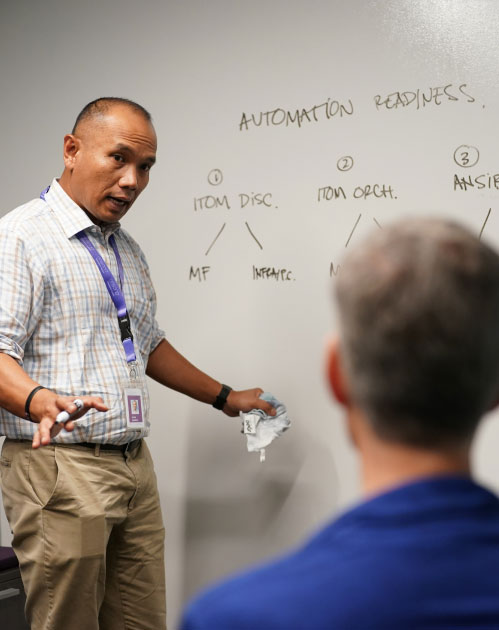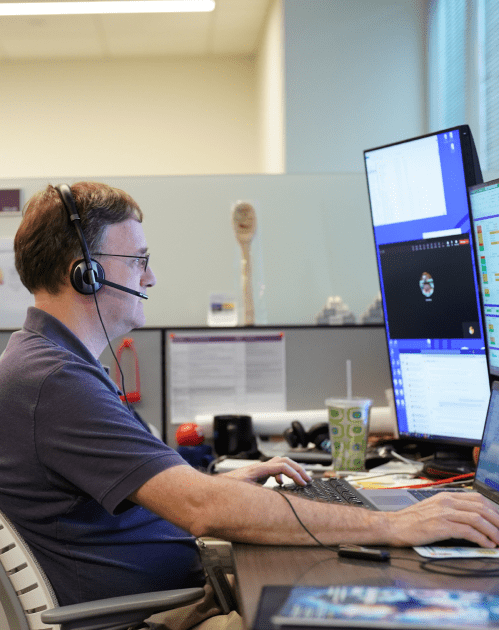AI readiness assessment: Your first step toward transformation
Organizations are increasingly embracing AI to power functions like fraud detection, self-service chatbots, and e-commerce analytics. In an era marked by persistent economic pressures, AI-driven technologies have become crucial in boosting operational efficiency and enabling data-driven decision-making.
However, 52% of senior IT decision-makers say that their data-driven ambitions are not matched by processes and technology on the ground. Poorly managed data, outdated infrastructure, and misalignment between teams can hinder any data and analytics project.
This gap underscores the need for organizations to conduct an AI readiness assessment before adopting AI and machine learning technologies. By identifying and addressing gaps in technology, skills, and processes with an AI readiness tool, organizations can seamlessly integrate AI to enhance decision-making and streamline operations.
What is AI readiness?
AI readiness refers to an organization’s ability to effectively adopt and integrate AI into its operations. An AI-ready organization has the infrastructure to support AI-powered technologies, high-quality data that’s properly governed and easily accessible, and alignment between business goals and AI initiatives. Financial resources, expertise in data and AI, and the organization’s openness to innovation also play an important role in its AI readiness.
AI capabilities are quickly becoming a competitive advantage, with more than half of C-suite leaders expecting AI to deliver cost savings this year. An AI-ready organization can leverage AI to harness vast amounts of data that would otherwise be untapped. As a result, you can extract valuable insights that support optimized operations and data-driven decision-making.
Core elements of an AI readiness assessment
Premature adoption of AI without an AI readiness assessment can result in a tangle of internal misalignment, integration challenges, and performance issues. A thorough evaluation is critical to ensure your infrastructure, people, and processes are equipped to handle modern AI solutions.

Data quality and governance
AI-powered applications are only as strong as the data they’re trained on. Before you start executing your AI roadmap, your data must be accurate, reliable, and managed in a way that complies with relevant regulations. A lack of visibility into data structures and versioning can make it difficult to trust and understand your data. Ineffective data governance can also render data inaccessible, which prevents teams from taking full advantage of data in their analytics operations.
To avoid these pitfalls, evaluate your current policies and data management practices to determine if they are up to par. Make sure you have clear policies in place for data management, including version control and data security.

Strategic internal alignment
Deploying AI-powered solutions requires a robust strategy with clear ownership of roles and responsibilities. The strategy should also describe your process for measuring the impact of AI initiatives and a financial plan to ensure you have adequate funding.
Alignment between these initiatives and business objectives is critical for earning stakeholder buy-in and ensuring your AI efforts are contributing to overarching business goals. For example, a retail company may integrate AI into its supply chain management to predict inventory more accurately, which aligns with its business objective of reducing operational costs while ensuring product availability.

IT infrastructure
Implementing AI-powered solutions without adequate infrastructure can lead to increased security vulnerability, performance issues, integration challenges, and a host of other problems. As part of your AI readiness assessment, consider whether your hardware and cloud computing resources can handle the complex computations, increased data volumes, and low latency requirements demanded by AI workloads.
Your infrastructure must be able to scale alongside your AI projects in real time. A hybrid cloud infrastructure combines the versatility and scalability of public clouds with the control of private clouds, offering an effective avenue to meet the demands of modern AI projects.

Talent and expertise
No matter how well your IT infrastructure supports AI-driven tools, you can’t fully embrace AI without the right talent and expertise. You need AI experts as well as data scientists and engineers to implement new solutions and optimize them over time. If you don’t have this talent internally, can you upskill and reskill current employees? Or does it make more sense to outsource these specialized tasks to third-party experts?
Moreover, it’s wise to evaluate the overall data literacy of your organization. If necessary, you may decide to offer training (e.g., foundational AI and machine learning training or data governance training) to all employees to ensure AI projects are executed effectively.

Iteration and experimentation
AI and machine learning projects necessitate an agile methodology. They call for processes and a cultural mindset geared toward embracing innovation, rapidly testing new ideas, and refining them in response to feedback.
One way to boost agility is to reconsider team structure. For example, a federated approach to data management helps democratize data access across your organization. In this system, data engineers offer support for the technical aspects of implementation while individual business units are empowered to apply their unique context and understanding to data. This enables teams to generate insights instantly without relying on bottlenecked specialist teams to fulfill every data-related request.

DataOps
Short for “data operations,” DataOps is a set of practices and policies designed to improve the speed, accuracy, and quality of data analytics projects. When integrated within a federated framework, DataOps can enhance collaboration across various business units and boost efficiency by automating data processes. Adopting DataOps also helps facilitate faster and more reliable insights tailored to specific departmental needs.
Consider whether your organization has expertise in data modeling and data testing, as well as experience with data management systems. You must also consider your organization’s cultural readiness to pursue DataOps — it’s critical to the success of your AI transformation.
Why Ensono is the right partner for your AI readiness assessment
The integration of AI into your digital ecosystem unlocks the full value of your data, helping you glean actionable insights that improve decision-making and streamline operations.
At Ensono, we have the expertise and AI readiness tools to conquer your biggest data challenges and create an IT ecosystem that supports evolving AI applications. Our Data & AI Assessment Strategy offers a framework to help assess your current environment, develop personalized recommendations to level up your data platform and reporting capabilities, and ensure seamless AI adoption.
Ready to unlock more value from your data? Get in touch with our experts today.